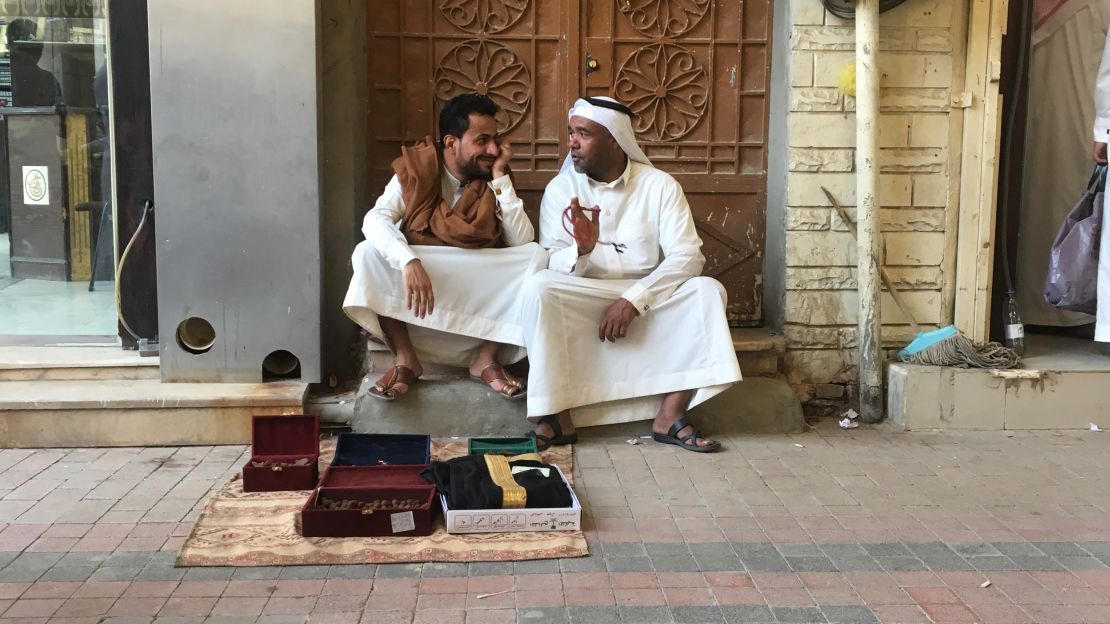Story highlights
Trump embarks on first international trip as US President
Saudis excitedly prepare for visit many see as "historic"
A south Asian merchant sits on a blanket covered with neatly arranged twigs. He is surrounded by men eager to get their hands on his product. To an outsider, the scene is puzzling. But the twigs are tooth cleaners known as miswak, and they harken back to the time of Islam’s Prophet Mohammed.
In many ways, Riyadh’s central Al-Deera area tries to recreate the Prophet Mohammed’s time. The outdoor market, known as the souk, is lined with tunic-clad traders of incense, traditional robes and gold. Across the street sits a desert fort. Around the corner is a sprawling plaza, whose charm belies a dark truth: it is Riyadh’s execution square.
But for a town so dedicated to honoring Islam’s early days, people here are embracing the present with open arms — specifically, this weekend’s visit by US President Donald Trump, and the political future that they believe he represents.
Trump’s first-ever overseas trip as President starts in the Saudi capital, and Arab hospitality here is on full display.
“He is very, very welcome,” one Saudi man told CNN quickly as he sauntered through the souk, or marketplace.
“I like Donald Trump. He’s good. He’s going to make everything different,” said Ahmad Al Mubarek, a middle-aged car dealer who says he lived for a time in Florida where he trained as a body-builder.
“Yeah, (Trump is) better than Obama. He’s a good man. He’s coming to Saudi Arabia because he likes Saudi Arabia … God bless America,” he added.

The sentiment is echoed in other parts of the kingdom’s capital, where praise for the visit is spoken of in hushed and forceful tones.
At a press conference on Thursday, Saudi Foreign Minister Adel Al-Jubeir hailed Trump’s visit as a “turning of the page” in Western-Muslim relations.
“We think that Trump’s choice to visit Saudi Arabia in his first foreign trip is a historic choice,” Al-Jubeir told the press conference. Trump is the first president to choose the Middle East as his first overseas destination.
The capital has thrown its weight into assuring that the visit is given its due, both in scale and ease.
Across the city, hotels, ministries and the airports are swarming with volunteers and organizers, young and old.
They are pulling 20-hour work days, but they are wide-eyed and the excitement is palpable. Some, while declining to state their names, speak of the event as “the biggest thing that’s happened to Saudi Arabia since its establishment.”
Trump flies in to Riyadh to join three summits: the Saudi Arabia and United States summit, the Gulf Cooperation Council and United States summit, and the Arab Islamic relations summit.
At the Arab Islamic relations summit, Trump is set to give a speech with 55 Muslim leaders and representatives in attendance.
Trump will deliver an “inspiring, yet direct” speech that will focus on “the need to confront radical ideology and his hopes, the President’s hopes for a peaceful vision of Islam to dominate across the world,” said Trump’s National Security Adviser H.R. McMaster.
The summits’ website opening page features a minute-by-minute countdown.
Coming to make amends?
Deeply religious Saudi Arabians haven’t forgotten about some of Trump’s more hostile remarks their religion, but some believe that the President has come to their kingdom to make amends.
During his campaign, Trump promised to keep Muslims out of America. As President, he went on to issue an executive order banning the entry of nationals from six Muslim-majority countries.
The kingdom is home to Islam’s two holiest sites, and the King’s preferred title is “Custodian of the Two Holy Mosques.”
“Maybe he (will) apologize for all Muslims for what he say about Islam,” Abdulaziz AlRasheed, a currency trader, told CNN.
Asked about then-Republican nominee Trump’s call for “the total and complete shutdown of Muslims entering the United Sates,” a linguistics professor at the King Saud University downplayed its importance.
“It is campaign rhetoric that tends to change with the presidency,” Abdullah al Asmari told CNN.
“(Trump’s) goal is to confront radicalism but not primarily Islam, but radicalism is evil.”
It’s all about Iran
For the Saudis that CNN spoke with, both officials and private citizens, only one issue matters: America’s Iran policy.
At Thursday’s press conference, Foreign Minister Jubeir devoted the greater part of his briefing on the US President’s visit to calls for “push-back” on the kingdom’s regional rival, Iran.
Saudi Arabia and Iran are at odds over a number of regional issues, including Iran’s nuclear program and what Saudis see as Tehran’s growing influence in the kingdom’s sphere of influence – especially in Syria, Lebanon and neighboring Yemen.
Speaking of the kingdom’s relationship with the new US administration, Jubeir said: “The policies that are now being looked at are focused on driving the point home to Iran that if it wants to be treated as a normal nation it must act as one.”
Animosity towards Iran appears to inform many Saudis’ views of Trump. The President has promised to “tear up” former President Barack Obama’s Iran nuclear deal, and the Saudis CNN spoke to are eager to see that happen.
“We would like to confront Iran. It has expansionist policies in the region,” Al Asmari told CNN.
“In terms of confronting Iran … I think he is a reliable ally. This is policy in the end.”




